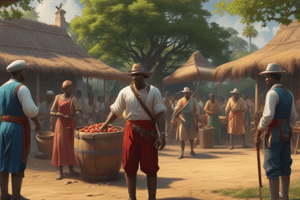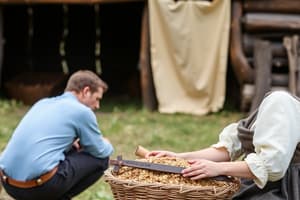Podcast
Questions and Answers
What was one of the main objectives of President Lyndon B. Johnson's Great Society?
What was one of the main objectives of President Lyndon B. Johnson's Great Society?
- To promote isolationist policies
- To eliminate poverty and racial injustice (correct)
- To increase taxes on the wealthy
- To expand military interventions abroad
Which program was specifically developed to provide health insurance for the elderly?
Which program was specifically developed to provide health insurance for the elderly?
- Peace Corps
- Medicare (correct)
- Medicaid
- VISTA
What significant change did the Truman Doctrine signify in U.S. foreign policy?
What significant change did the Truman Doctrine signify in U.S. foreign policy?
- Withdrawal from global alliances
- Isolation from European conflicts
- Support for countries resisting communism (correct)
- Support for atomic disarmament discussions
What was a major consequence of the Cuban Missile Crisis?
What was a major consequence of the Cuban Missile Crisis?
Which event was influenced by the Supreme Court decision in Bush v. Gore?
Which event was influenced by the Supreme Court decision in Bush v. Gore?
What economic structure was primarily used by the Southern Colonies?
What economic structure was primarily used by the Southern Colonies?
Which document established the first framework of government in the New World?
Which document established the first framework of government in the New World?
Which of the following best describes the economy of the Middle Colonies?
Which of the following best describes the economy of the Middle Colonies?
The House of Burgesses was significant because it was:
The House of Burgesses was significant because it was:
Which philosopher is best known for the idea of natural rights that influenced American government?
Which philosopher is best known for the idea of natural rights that influenced American government?
What was one outcome of the French and Indian War?
What was one outcome of the French and Indian War?
The concept of a social contract suggests that:
The concept of a social contract suggests that:
Which of the following characterized New England's economy?
Which of the following characterized New England's economy?
What was the significance of Thomas Paine's pamphlet 'Common Sense'?
What was the significance of Thomas Paine's pamphlet 'Common Sense'?
Which battle is considered a turning point of the American Revolutionary War?
Which battle is considered a turning point of the American Revolutionary War?
What was a primary weakness of the Articles of Confederation?
What was a primary weakness of the Articles of Confederation?
What policy did the Homestead Act promote?
What policy did the Homestead Act promote?
What did the Seneca Falls Convention of 1848 aim to achieve?
What did the Seneca Falls Convention of 1848 aim to achieve?
What event marked the official start of the Civil War?
What event marked the official start of the Civil War?
What was the primary goal of the Freedmen's Bureau during Reconstruction?
What was the primary goal of the Freedmen's Bureau during Reconstruction?
Which philosophy did W.E.B. Du Bois advocate for African Americans?
Which philosophy did W.E.B. Du Bois advocate for African Americans?
What was the 'Atlanta Compromise'?
What was the 'Atlanta Compromise'?
Which reform was prompted by Upton Sinclair's 'The Jungle'?
Which reform was prompted by Upton Sinclair's 'The Jungle'?
What was one result of the Spanish-American War?
What was one result of the Spanish-American War?
What did the 24th Amendment achieve?
What did the 24th Amendment achieve?
Which plan aimed to suffocate the Confederate economy during the Civil War?
Which plan aimed to suffocate the Confederate economy during the Civil War?
What was the main purpose of muckrakers during the Progressive Era?
What was the main purpose of muckrakers during the Progressive Era?
Flashcards
Great Society
Great Society
L.B. Johnson's plan to fight poverty and inequality
Medicare
Medicare
Healthcare for the elderly
Truman Doctrine
Truman Doctrine
US support for countries fighting communism
Marshall Plan
Marshall Plan
Signup and view all the flashcards
2008 Recession
2008 Recession
Signup and view all the flashcards
New England Economy
New England Economy
Signup and view all the flashcards
Middle Colonies Economy
Middle Colonies Economy
Signup and view all the flashcards
Southern Colonies Economy
Southern Colonies Economy
Signup and view all the flashcards
Mayflower Compact
Mayflower Compact
Signup and view all the flashcards
House of Burgesses
House of Burgesses
Signup and view all the flashcards
New England Town Meetings
New England Town Meetings
Signup and view all the flashcards
John Locke's Natural Rights
John Locke's Natural Rights
Signup and view all the flashcards
French and Indian War
French and Indian War
Signup and view all the flashcards
Common Sense Pamphlet
Common Sense Pamphlet
Signup and view all the flashcards
Battle of Saratoga
Battle of Saratoga
Signup and view all the flashcards
Declaration of Independence
Declaration of Independence
Signup and view all the flashcards
Articles of Confederation
Articles of Confederation
Signup and view all the flashcards
Shays' Rebellion
Shays' Rebellion
Signup and view all the flashcards
Manifest Destiny
Manifest Destiny
Signup and view all the flashcards
Louisiana Purchase
Louisiana Purchase
Signup and view all the flashcards
Homestead Act
Homestead Act
Signup and view all the flashcards
Seneca Falls Convention
Seneca Falls Convention
Signup and view all the flashcards
Abolitionist Movement
Abolitionist Movement
Signup and view all the flashcards
Dred Scott Decision
Dred Scott Decision
Signup and view all the flashcards
Civil War
Civil War
Signup and view all the flashcards
Anaconda Plan
Anaconda Plan
Signup and view all the flashcards
Freedmen's Bureau
Freedmen's Bureau
Signup and view all the flashcards
Study Notes
Colonial Foundations and Early Government
- New England's economy relied on shipping and fishing, aided by its coastal geography.
- Middle Colonies had a diverse economy, with trade, agriculture, and commerce.
- Southern Colonies focused heavily on cash crops (tobacco, rice, indigo), supported by enslaved labor.
- Geography shaped colonial economies; New England's rocky terrain limited agriculture, while the South's fertile land supported large-scale farming.
- Middle Colonies' relative peace and diversity attracted numerous ethnic groups.
Colonial Government Structures
- The Mayflower Compact was the first written framework of self-governance in the New World.
- The House of Burgesses was the first legislative assembly, modeled after the English Parliament.
- New England Town Meetings were a form of direct democracy, where local citizens made decisions.
Influences on American Government
- John Locke's philosophy of natural rights (life, liberty, and property) influenced American founding principles.
- Magna Carta established the precedent of limited government, restricting monarchical power.
- The social contract theory emphasized government authority derived from popular consent.
Revolutionary Era and Formation of Government
-
The French and Indian War was a conflict between British colonists and French forces over North American territory.
-
The Albany Plan of Union, proposed by Benjamin Franklin, advocated for colonial unity against France.
-
Increased British debt after the war led to colonial taxation and tensions.
-
Thomas Paine's "Common Sense" promoted independence from Britain.
-
The Battle of Saratoga convinced France to ally with the colonists.
-
The Declaration of Independence, adopted in 1776, articulated colonial grievances and asserted inalienable rights.
Articles of Confederation and Its Challenges
- The Articles of Confederation established a weak federal government with limited powers.
- Shays' Rebellion exposed the weaknesses of the Articles, illustrating the federal government's inability to address civil unrest.
- Economic instability arose from the lack of a national currency and state-issued money.
Expansion and Social Change
- Manifest Destiny was the belief in America's right to continental expansion, impacting Native American policies.
- The Louisiana Purchase (1803) significantly increased U.S. territory.
- The Homestead Act encouraged westward migration, leading to demographic changes & conflicts with Native Americans.
Social Movements and Reform
- The Seneca Falls Convention (1848) launched the women's suffrage movement, advocating for equality.
- Abolitionist movements gained strength, with key figures like Frederick Douglass and Harriet Tubman.
- The Dred Scott decision intensified sectional tensions over slavery, contributing to the Civil War.
Civil War and Reconstruction
-
The Civil War began with South Carolina's secession and the attack on Fort Sumter.
-
Key battles (Antietam, Gettysburg) were pivotal, with Gettysburg marking a turning point for the Union.
-
The Anaconda Plan was the Union's strategy to suffocate the Confederate economy through blockade and control of the Mississippi River.
-
The Freedmen's Bureau aimed to assist former slaves.
-
The Compromise of 1877 ended Reconstruction.
-
The Ku Klux Klan sought to suppress African American rights through violence.
Key Figures and Movements in African American History
- W.E.B. Du Bois and the Niagara Movement: advocated for higher education, civil rights, and black professionals.
- Booker T. Washington and the Tuskegee Institute: promoted vocational training and economic self-reliance.
Progressive Era Reforms
- Theodore Roosevelt played a key role as a trustbuster, working to break up monopolies.
- Upton Sinclair's "The Jungle" exposed food safety problems, leading to the Meat Inspection Act.
- Jacob Riis exposed urban poverty, prompting social reform.
- Jane Addams founded Hull House to assist immigrants.
Major Progressive Policies and Legislation
- The Sherman Antitrust Act aimed to reduce monopolies.
- Various reforms addressed labor conditions, women's rights, and public health.
- Muckrakers exposed corruption and injustices, fostering public demand for reforms.
Major Wars and Their Impact on America
-
The Spanish-American War led to U.S. acquisition of territories (Guam, Philippines, Puerto Rico), marking a turn towards imperialism.
-
The Teller Amendment promised Cuban independence; the Platt Amendment limited Cuban sovereignty.
-
World War I involved trench warfare, new technologies, and U.S. entry following the Lusitania sinking and the Zimmerman Note.
-
The Treaty of Versailles imposed harsh penalties on Germany.
-
The League of Nations, proposed by Wilson, was rejected by the U.S. Congress.
Civil Rights Movement and Social Change
- The Civil Rights Movement involved nonviolent protests led by figures like Martin Luther King Jr.
- Brown v. Board of Education declared racial segregation in schools unconstitutional.
- The 24th Amendment aimed to eliminate barriers to voting for African Americans.
Great Society and Its Impact
- President Lyndon B. Johnson's Great Society aimed at reducing poverty and inequality.
- Medicare and Medicaid provided health insurance to the elderly and poor.
- VISTA assisted low-income communities, similar to the Peace Corps.
Modern America and Global Relations
- The Truman Doctrine provided U.S. support to countries resisting communism.
- The Marshall Plan rebuilt post-WWII Europe, preventing communist expansion.
- The Cuban Missile Crisis highlighted Cold War tensions.
Recent Developments in American History
- The 2000 election generated controversy and the Bush v. Gore Supreme Court decision.
- The 2008 recession impacted the U.S. economy.
- Barack Obama's election in 2008 marked a historic moment.
Studying That Suits You
Use AI to generate personalized quizzes and flashcards to suit your learning preferences.
Description
Explore the economic foundations and governance structures of the early American colonies. This quiz covers the diverse economies of New England, Middle, and Southern Colonies, along with significant documents like the Mayflower Compact and the House of Burgesses. Test your knowledge of how geography and philosophy shaped early American governance.




